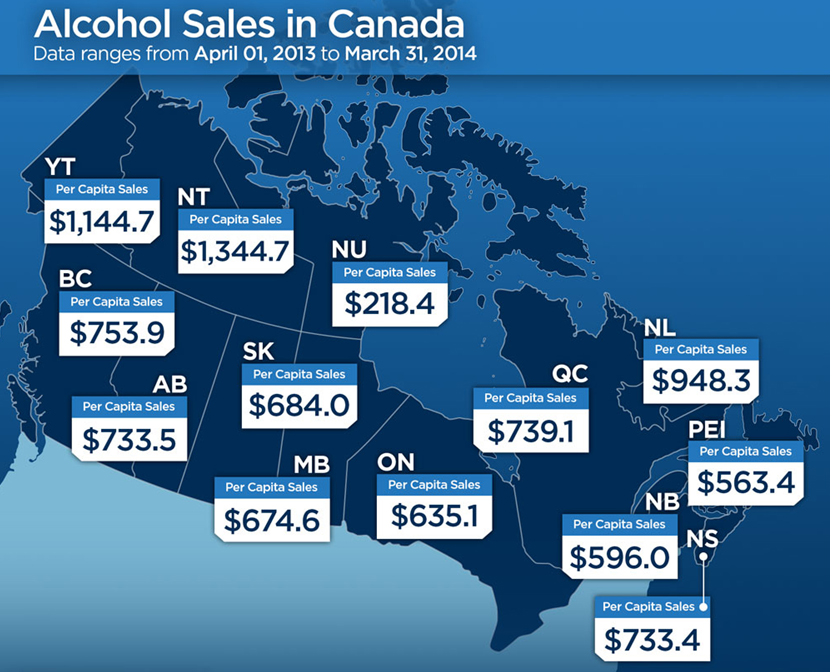A dubious victory for Ontario’s craft brewers
Ever wondered why Canada is such a profitable beer market? Although beer consumption is only 22 million hl and declining slightly, Canada ranks as 6th largest beer profit pool in the world. That’s because Canadians continue to spend freely on booze.
Canada’s Bureau of Statistics, in May 2015, released new numbers on the sale of alcoholic beverages and concluded that Canadians spent CAD 20.5 billion (USD 16.7 billion) on beer, wine, and spirits in 2013/2014, up 1.1 percent on the previous year.
Beer remains the drink of choice for many Canadians as CAD 8.7 billion was spent nationwide on the drink. On a per capita basis, Canadians are spending CAD 294 each (USD 240) on beer, albeit with huge regional differences as the chart below shows.
Consumers in the Yukon and Northwest Territories bought the most litres of beer per capita with 124.3 and 98.5, respectively, far above the Canadian average of 75.9 litres, it was reported.
The other reason why Canada is so profitable relates to the country’s bizarre beer distribution system which is a veritable minefield, as each province sets its own rules and regulations and retains its own authorities.
On a closer look, Canada’s beer sales regulations make the country look like a genuine nanny state. Canada’s prohibitive beer regulations are usually justified with the argument that they make it easier to get the product on the shelf. For example, in Ontario, which is Canada’s largest beer consuming region with total sales of approximately 6.4 million hl (2014), until recently, there were only two chains through which one could buy beer: the Beer Store and the Liquor Control Board of Ontario (LCBO). Rather than approaching individual stores to convince them to carry their product, brewers needed only deal with two entities. That was the theory.
Now who is the owner of the Beer Store? Originally it was owned by a consortium of Ontario-based brewers when it was set up in 1927 as Brewers’ Retail, but is now owned by Molson Coors, AB-InBev of Belgium (which owns Canadian brewer Labatt) and Sapporo of Japan (which owns brewer Sleeman). In other words, craft brewers had to get their big competitors to sell their beers. Hmmm.
Strange, that the big brewers should be allowed to own the retail side of the beer business too, yet this may explain why foreign brewers were so keen on buy into the Canadian beer market.
Surprisingly, in April 2015 sweeping changes to Ontario’s beer distribution were introduced by legislators and sold to the public under the grand label “liberalisation”. These changes foresee that as of Christmas this year beer will eventually be sold in 450 of the province’s 1,500 grocery stores. However, the beer sold in Ontario’s supermarkets will be limited to six-packs or smaller.
On the face of it, it seems like a major improvement that under the changes, the 448-outlet Beer Store chain will have to devote at least 20 percent of its shelf space as well as merchandising and marketing programmes to craft beers. The province’s 150 microbrewers should be duly pleased, if they did not smell a rat, because the increased shelf space will apply only to 100 self-serve stores, not to the majority of regular Beer Stores where beer is kept out of sight, behind the counter.
To make matters worse, a new levy will add CAN 1.00 over the next four years to the cost of a 24-pack that currently retails for about CAN 34.00 in Ontario (compared to CAN 40.00 for the same beer in Alberta and British Columbia.)
This means that consumers will pay about a penny more per bottle per year as this levy is phased in, eventually flushing an extra CAN 100 million or so into the treasury’s coffers.
Somewhat countering the liberalisation efforts, under the new measures, beer prices will be set so they are the same at supermarkets, the 651-outlet LCBO, and the Beer Store.
The good thing is that all companies brewing beer in Ontario will be allowed to buy an ownership stake in the Beer Store (if they can afford it), returning the retailer to its 1927 co-operative roots.
The first supermarkets will have beer on their shelves before Christmas with brews available in as many as 150 large grocery stores by 1 May 2017 and another 300 in the weeks and months after that, it was reported.
There will be new publicly owned boutiques for niche items like craft beers, and specialty spirits such as single malt Scotch.
Legislators also promised that 9,000 small licensees across the province will soon be allowed to buy beer at lower prices for their bars and restaurants.
As Canadian media had disclosed, bar owners and restaurateurs were forced to purchase beer from the Beer Store at higher prices than ordinary consumers.
Funny country, that.

